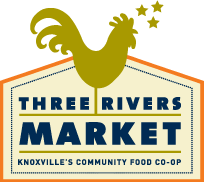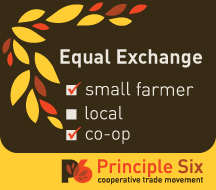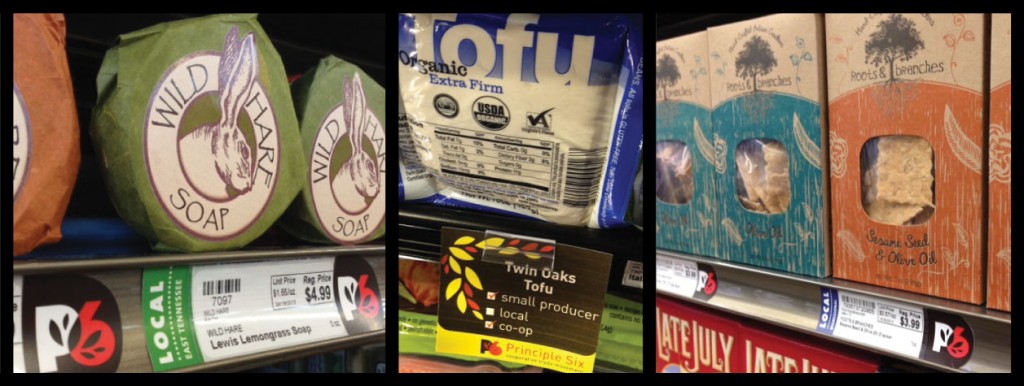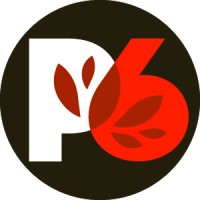Principle Six (P6)
Principle Six is: Small, Local, Cooperative.
We believe that small, local, and cooperative producers are the backbone of healthy and sustainable regional food systems everywhere. Created by cooperatives, Principle Six (P6) ensures that your purchases directly support small farmers, cooperative and non-profit businesses, and local farmers and producers.
Whether your money moves nine miles down the road to Neubert Springs Gardens for locally grown and organically produced potatoes, or three thousand miles to Oro Verde, Peru, where Equal Exchange sources fair trade cocoa for chocolate bars, the transaction is transparent, inviting consumers to look closely at the source of their food. Together, Three Rivers Market’s members, customers, and producers are investing in an equitable and sustainable food system with P6 guiding us to products that meet our highest values.
How Does P6 Work?
With P6, we can shop our values. By promoting the products and producers that meet our highest values, P6 engages and empowers consumers, building stronger cooperative relationships between farmers, manufacturers, distributors, retailers, and consumers.
To be eligible for P6 designation, items must come from a producer that meets at least two of these three criteria:
• local farmer, grower, or producer
• small farmer, grower, or producer
• cooperative or non-profit business
Produced by the James Beard Award-winning producers of Perennial Plate, Daniel Klein and Mirra Fine, here’s a sample of P6 in action:
[vimeo id=”113955757″ mode=”normal” align=”center”]
What Does the Name Mean?
Around the world, cooperatives are organized according to seven international cooperative principles:
- Voluntary and Open Membership
- Democratic Member Control
- Member Economic Participation
- Autonomy and Independence
- Education, Training and Information
- Cooperation Among Cooperatives
- Concern for Community
The sixth cooperative principle – cooperation among cooperatives – is the cornerstone of the P6 movement.
What Do We Mean by “Cooperative Trade Movement?”
Every time we purchase a product, we are engaging in trade. Behind every transaction, money exchanges hands and there is a potential to add value in the supply chain. But who gains, how much profit is made, and how the profits are used, are generally hidden. P6 de-mystifies all that goes on behind the scenes and, in the process, highlights where trade is conducted equitably.
How can I tell which items are P6?
Look for the label on the shelf or ask a staff member!
Who is part of the cooperative trade movement?
P6 is a national movement! These co-ops across the United States and Canada participate:
• CROPP Cooperative (La Farge, WI)
• Eastside Food Co-op (Minneapolis, MN)
• Equal Exchange (West Bridgewater, MA)
• Farmer Direct Co-op (Regina, Saskatchewan)
• The Good Earth Food Co-op (St. Cloud, MN)
• Maple Valley (Cashton, WI)
• Moscow Food Co-op (Moscow, ID)
• Ozark Natural Foods (Fayetteville, AR)
• Roanoke Natural Foods Co-op (Roanoke, VA)
• Seward Community Co-op (Minneapolis, MN)
• Three Rivers Market (Knoxville, TN)
• Viroqua Co-op (Viroqua, WI)
Why P6 matters to us.
We joined P6 to highlight small, local, and cooperative products at our store. Buying P6 items ensures that your purchases directly support small farmers, cooperative and non-profit businesses, and local farmers and producers. With P6 signs and information throughout the store, we can simplify your shopping trip, making it clear where your dollars go and what they support.
To learn more about the P6 movement visit P6.coop.
More
Our P6 Cooperative Trade Movement launch event was held on August 25, 2013. See photos and read about it here: Sunday Supper at the Co-op.















